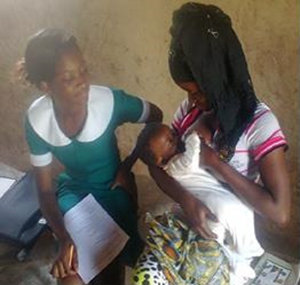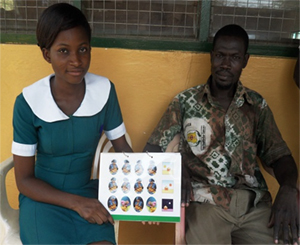The Important Role of Nutrition Counseling in Ghana

"I thought I did not have enough breastmilk, but now I know I just lacked knowledge on appropriate breastfeeding practices," said Madam Kusumi Gipi, a nursing mother in Ghana's Northern Region. She could not hide her joy after being counseled on breastfeeding and noticing an increase in her milk flow.
SPRING is working in Ghana to improve infant and young child nutrition, partly by strengthening breastfeeding practices. Funded by the U.S. Agency for International Development (USAID), SPRING/Ghana's scaling up of the UNICEF infant and young child feeding (IYCF) training package in 15 districts in northern Ghana encourages early initiation of breastfeeding, exclusive breastfeeding for the first six months, and continued breastfeeding for the first two years. Exclusive breastfeeding during the first six months is instrumental for an infant's optimal physical and mental development. In a practical one-on-one session, nutrition counseling introduces mothers and caregivers to the benefits of optimal feeding practices.
Madam Gipi's baby was not suckling well, and Madam Gipi thought it was because she did not have enough breastmilk. She learned this was not the case after meeting health workers Mr. John Kuunang and Miss Rufina Bantaabu during a training session in Woribogu, Tolon district.
I thought I did not have enough breastmilk, but now I know I just lacked knowledge on appropriate breastfeeding practices.
—Madam Kusumi Gipi, beneficiary of SPRING/Ghana's nutrition program
By asking targeted questions, the health workers discovered that the baby had been breastfed only twice all day, and it was now late in the afternoon. According to the health workers, the baby should have been breastfed at least six times since the morning. They asked Madam Gipi to demonstrate how she usually holds her baby during breastfeeding. The health workers realized that poor positioning and attachment of the baby was causing weak suckling.

Using counseling cards and techniques created by the Ghana Health Services with support from UNICEF, the health workers demonstrated to Madam Gipi the appropriate positioning and attachment practices. When she tried them, she noticed that her baby suckled much more vigorously than before. The health workers assured her that frequent feeding sessions and proper attachment by the baby help stimulate milk production and enough food for optimal growth. At the end of the counseling session, Madam Gipi was quite satisfied.
Using training materials adapted from UNICEF for use by the Ghana Health Services, SPRING/Ghana builds health worker capacity in high-quality nutrition counseling across the project's operational districts in northern Ghana. Health workers then empower mothers like Madam Gipi by teaching them how to properly feed their children, promoting healthy growth and development.
Improving IYCF counseling among health workers, community volunteers, groups, and caregivers is a primary objective for SPRING/Ghana in its efforts to reduce the prevalence of stunting in the Northern and Upper East Regions of Ghana. SPRING/Ghana has rolled out the IYCF training package to 1,105 health staff and 1,114 community volunteers and community groups across 15 districts in the Northern and Upper East Regions. SPRING/Ghana has also trained and formed 110 Mother-to-Mother Support Groups (MTMSG) that include 1,650 individuals across 15 districts. These groups provide a peer education platform for mothers and caregivers to learn about better nutrition practices. Nutrition counseling is one part of SPRING/Ghana's "1,000-Day Household Approach," a holistic program focused on households with pregnant women and children under two years of age that combines elements of nutrition, hygiene, and agricultural practices aimed at improving health outcomes in 1,000-day households.